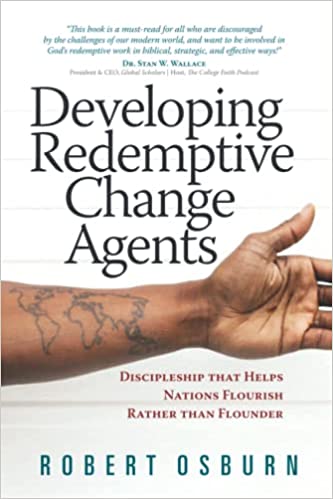In his important new book, Developing Redemptive Change Agents: Discipleship that Helps Nations Flourish Rather than Flounder (Wilberforce Press, December 2021), Robert Osburn deals with one of the most urgent questions facing the church in the 21st century. Why, despite their large numbers in the United States and rapidly growing numbers in Africa, Asia and Latin America, do evangelical Christians have so little influence on their surrounding culture?
It wasn’t always like this. In previous generations, as Osburn notes, “evangelicalism was massively transformative.” The evangelical movement of the eighteenth and nineteenth centuries served the poor, called attention to the worth of oppressed African slaves, and formed the backbone of the abolition movements in Britain and America. They provided the political support for movements of social reform and moral uplift that improved the lives of women, prisoners, children, the mentally ill, and other marginalized groups. Evangelicals founded colleges, and organized an amazing profusion of charitable and mission groups.
Given this track record, why isn’t evangelicalism having the same impact around the world in the twenty-first century? And more importantly, what can be done about it?
Osburn addresses these critical questions from the vantage point of a lifetime of experience as both a thought-leader and a practitioner. For more than 30 years, he has led The Wilberforce Academy, an organization that has trained university exchange students from around the globe in applied biblical worldview, equipping them to be what Osburn calls “redemptive change-agents” for God’s Kingdom. This book is a rich distillation from one of the most important Christian thinkers and leaders working in this space.
Osburn’s purpose in writing the book is to help the church recover Jesus’ model of discipleship, which involves both personal spirituality and redemptive, social change. He wants to help the church retool its discipleship in ways that equip Christians to solve urgent societal problems on the basis of a Christian worldview.
In chapter one, Osburn explores several historical realities behind the evangelical disengagement in culture, which he describes as a “tragic division between private faith and public secularism.” As a result, today’s Christians are double-minded. They may have a robust private faith and devotional life, but in the public arena, they largely function according to the established norms and practices of the dominant secular culture. The result? They no longer act as “salt and light” in the broader society.
Osburn provides five reasons for how this came about. He touches first on the religious pluralism championed by John Locke and others, a pluralism that while necessary in a diverse society, had the effect of privatizing Christian faith. Second, he spotlights the rise of modernism and secularism in the 19th century, which elevated science to the position of supreme authority on matters of public knowledge, while relegating religious belief to the realm of personal conviction. Christians largely went along with this shift. Third, he identifies the early twentieth century rise of the Social Gospel Movement among mainline Protestant denominations, and its rejection by a counter-movement known as Fundamentalism. Fundamentalists, the precursor to today’s evangelicals, upheld the authority and inerrancy of the Bible, and the centrality of the Gospel, but downplayed social and cultural engagement because of its associations with the Social Gospel. Lastly, Osburn mentions the rise of aggressively anti-Christian revolutionary movements in the 19th Century, such as Marxism. In reaction, many orthodox Christians began to focus almost exclusively on inward, spiritual transformation at the expense of outward social change, despite the deplorable conditions borne of the Industrial Revolution.
These historic shifts, largely in the 19th and 20th centuries, had a major impact on the evangelical church’s understanding of her mission. The Great Commission of Matthew 28:18-20 was recast, not as a mandate to make disciples of all the nations, with all the social and cultural implications inherent, but to a call to make disciples of individuals, with discipleship reduced to training in personal piety.
As evangelical Christians abandoned their calling to disciple nations, others stepped into the void. As a result, according to Osburn, “secularists have dominated the terms of social engagement for over a century.” As Christians gave up the earlier task of caring for their neighbors, the state stepped in, and “the profession of social work was birthed, and the field came to be dominated by the materialist assumptions.” Because their analysis of poverty was rooted in secular materialism, it largely failed to deliver on its promise.
Osburn sees this as a moment of opportunity for the church to reengage in culture by championing solutions rooted in a distinctively biblical worldview. But for this to happen, the church will need a new vision for discipleship. Here, Osburn argues that while discipleship must include training in formative spiritual practices like prayer, scripture reading and study, and evangelism, it must also entail training in redemptive action to relieve suffering, fight injustice, and minister to others.
This model of discipleship is consistent with the example of Christ, who according to Osburn, “demonstrated the essence of the redemptive change agent in his three-fold office of prophet, priest, and king.” Prophets “truthfully and accurately identify real problems.” Priests “create effective solutions that reflect deep identification with the people suffering the problem.” Kings “cultivate the requisite authority and resources needed in order to administer the remedy.”
In the New Testament, this redemptive action is often referred to as “good works,” which all Christians are called to. Osburn is clear that these good works are not salvific, but rather the fruits of salvation and regeneration. They make the Gospel attractive to non-believers, and are fundamental to Christ’s purpose for His followers. Human beings were designed for good works by virtue of the cultural mandate to protect creation and make it flourish. According to Osburn, “Good works are not mere window dressing on a pious, holy life, but courageous efforts to undertake those morally virtuous actions that bless one’s neighbors.”
In summary, Osburn is pushing for a discipleship that is “consistent with the full-orbed, socially transformative Gospel of the Kingdom. A discipleship that links personal spirituality with social ethics.”
He concludes his first chapter by warning us to avoid two extremes. The first, championed by those on the evangelical right, such as the late Jerry Falwell, Pat Robertson, and the Moral Majority emphasized political action, but largely ignored cultural trends upstream from politics. At the other extreme is the present-day approach championed by many on the evangelical left that borrows heavily on cultural Marxism and academic critical theory, rather than a distinctly biblical worldview.
In chapter two, Osburn provides a kind of “SWOT analysis” (Strengths, Weaknesses, Opportunities, and Threats) of our present situation. Having already addressed weaknesses in the first chapter, he notes that the Bible-believing church brings unique strengths to the task of cultural engagement. For example, biblically informed leadership should be marked by courage, skill, creativity, and risk-taking in the pursuit of the common good, rather than more worldly approaches that are self-centered and transactional in nature, and that “thrive on bribes, incentives and favors.”
Osburn highlights several threats or challenges present in our current moment, including authoritarian governments, bribery and corruption, environmental upheavals, wars, persistent poverty in places like Sub-Saharan Africa, Islamic terrorism, and the aggressive secularism and moral nihilism of the decadent, post-Christian West, including its growing efforts to spread the ethics of the sexual revolution worldwide through pressure campaigns.
Osburn notes that over the past forty years, the approach to confronting many of our most pressing social problems have been bureaucratic, top-down attempts at social engineering by secular elites. These approaches have largely failed, and their failure has bred cynicism, hopelessness and anger. He argues that biblically-based redemptive change agents should resist the intrusion and coercive power of the state by cultivating mediating institutions including “the family, church, labor unions, professional associations, and civic groups.”
Osburn ends the chapter by listing several opportunities for the church, including the global growth of international education, globe-spanning technologies, and enhanced opportunities for wealth creation.
In chapter three, Osburn fortifies his theological case for Christians social engagement by arguing that God’s intent has always been to foster the health, wellbeing, and flourishing of whole nations. This case is built on five biblical foundations: (1) God intends humans to flourish in His Kingdom; (2) Sin causes people and their nations to flounder in poverty, injustice, violence, and suffering; (3) Redemption is grounded in the work of Christ and expressed through believers as they seek to help people, communities, and nations align with God’s intentions; (4) God intends to bless, heal, and disciple nations as His followers foster redemptive change in creation and culture; and (5) the church is called to model the pathway and principles for human flourishing.
In short, Osburn makes a compelling argument for Christian mission as “discipling nations,” as opposed to discipling individuals within nations. He writes: “The Matthew 28: 19-20 call to disciple nations was not only a call to make individual converts who would be transformed disciples, but also a secondary call to convert the institutions, symbols, and structures of whole societies.”
In chapter four, Osburn examines the attributes of redemptive change agents. First and foremost, they are sensitive to how God sees brokenness in our fallen world. A hallmark of redemptive change agents is a holy dissatisfaction with the status quo of our fallen world, and a stubborn conviction that God has something better for our neighbors, communities, and nations.
A second attribute: redemptive change agents are thoroughly grounded in a Christian worldview, in full confidence that “a Christian worldview makes the best sense of reality and that solutions need to be based in reality, not in utopian dreams.” Finally, redemptive change agents place little hope in their own power and wisdom, but rather depend on God for the strength needed to carry out their ministry.
Trusting that God is actively at work in the world in redemptive ways, inviting us to work with Him, in His strength, and for His glory, fosters other key attributes of redemptive change agents: courage and a willingness to take bold risks and seek new solutions to intractable problems, combined with resolute determination, patience, persistence, and a resilient spirit that does not give up.
In chapters five and six, Osburn explores core practices and strategies employed by redemptive change agents. They must be skilled at cultural and social analysis from the vantage point of a Christian worldview, and highly adept at separating truths from lies, and good from evil. Training in a Christian worldview coupled with how this worldview differs from other key belief-systems is a critical first step (a very helpful and concise worldview comparison chart is provided in Appendix Three). Disciple Nations Alliance has also produced a worldview comparison chart that is available as a free download here. Having identified both the good and the evil, redemptive change agents work to expose the evil and remove it. They “advocate policies that punish evil and reward righteousness.” They create “programs, services, and products to ameliorate evils and enhance human flourishing.” Additionally, they work to “conserve existing social realities, programs, and policies” that reflect the truth, goodness and beauty of God’s Kingdom.
Convinced that our battle is not against flesh and blood, redemptive change agents seek to evangelize those trapped by evil, seeking their redemption and transformation. And realizing that cultural transformation is too large a task for any one person or organization, they participate in “high-performing” networks and advocate for and participate in others’ redemptive change efforts. They also focus attention on local churches, challenging the church to be a visible and attractive model of what a transformed society ought to look like in practice.
Finally, borrowing from the work of University of Virginia sociologist James Davidson Hunter, Osburn encourages redemptive change agents to “practice faithful presence.” He describes this as a posture of modesty and humility, coupled with “a commitment to pursue aesthetic excellence and covenantal commitments with those around us.” Faithful presence focuses primarily on “the domain of culture rather than politics.”
In chapters seven and eight, Osburn turns his attention to key commonalities shared by redemptive change agents, and provides several real-world examples. He starts by making clear that redemptive change agents are not a special class of elite, super-Christians, but rather, ordinary Christians who share with the rest of humanity both the imago Dei, as well as a sinful nature.
Osburn lays out eight commonalities of redemptive change agents. They experience what he calls “disorienting dilemmas and discoveries.” They cross cultural, geographic, or national boundaries. They actively seek out committed mentors, and have a disciplined and deep spiritual and emotional life. They are also active learners, and they share a deep commitment to the Christian worldview. He then describes several examples of redemptive change agents who share these commonalities. These include British abolitionist, politician and social reformer William Wilberforce (1759-1833), Chinese educator James Yen (1893-1990), Philippine poverty-fighter Melba Maggay (1950-), American politician and founder of Prison Fellowship, Charles Colson (1931-2012), Norwegian social reformer Hans Hauge (1771-1824), Mother Teresa of Calcutta (1910-1997), and Abbel Joseph (1981-), a young redemptive change agent working with the poor in Haiti.
Osburn concludes the book by listing several “risk factors” for which redemptive change agents should be aware. These include individualism, burnout, a “Savior complex,” which he describes as “an over-emphasis on one’s efforts at the expense of the redeeming power of God.” He also mentions indecisiveness, moral failure, dependency, co-option by political powers, utopianism, theological syncretism, persecution, corruption, and “instrumentalization,” or the undermining of Christian faith by deploying it only for the positive social benefits it offers.
Robert Osburn provides a clear, compelling vision for a full-orbed Christianity. One that is transformative in all areas of life, and “refuses to settle for mere personal happiness, a satisfying spiritual life, release from psychological pain, or finding a good relational network.”
Readers will benefit greatly from Osburn’s lifetime of experience as they work to help recover a biblically-rich understanding of discipleship that marries redemptive action with personal spirituality. Order your copy here.
Scott D. Allen
President, Disciple Nations Alliance





Thank you for your thorough review of this book. I look forward to learning more. This will be a good resource to reference inviting others to being redeemed, transformed change agents for Jesus.